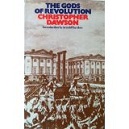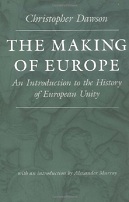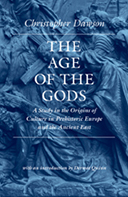The Gods of Revolution was first published in 1972, two years after the author’s death. The work was formed from chapters on the French Revolution intended for a volume covering the period from the Enlightenment to the modern era. The Gods of Revolution is not simply a history of the French Revolution, but a brilliant analysis of the intellectual forces leading up to and resulting from the French Revolution.
Central Themes
The work is divided into three major parts. The first of these deals with the different streams of ideas that gave birth to the Revolution: Voltaire and the Enlightenment, Rousseau’s dream of the ‘Noble Savage’ and the political idealism of Thomas Paine.
Speaking of the effects of Rousseau’s philosophy, Dawson remarks: “It is impossible to exaggerate the effect of Rousseau’s teaching on his generation. It came into the brilliant artificial world of the Enlightenment like a warm west wind from the fields into a lighted salon, extinguishing the tapers and filling the air with the scent of damp earth and rain-soaked vegetation.”
In part two, Dawson discusses the French Revolution from a historical perspective, although without ignoring the swirling forces of ideas that continued to animate it. For Dawson it was not the peasants or the proletariat who made the Revolution, but the official class of parliamentarians and lawyers, inspired by religious theologians, intellectual courtiers, and the romantic disciples of Rousseau – driven by men like Robespierre, “the high priest of the Jacobin religion” and Marat, “that strange hybrid of Swiss doctor and Sardinian Brigand.”
Part three explains the impact of the Revolution on subsequent history, including the rise of Romanticism and the European nationalist movements, as well as the religious revival that followed in its wake. One of the many interesting passages in this section concerns William Blake, of whom Dawson writes: “Yet whoever has the patience and the imagination to follow him through his strange visionary world will gain a more direct insight into the process of spiritual change that was taking place under the surface of European consciousness than is to be found in any other writer.”
Evaluation of the Work
As Nigel Dennis wrote in his original review of the book in 1972, “The French Revolution described by Taine or Dickens – a revolt of the downtrodden against their oppressors – makes no appearance at all in this book. If this is Dawson’s main weakness as an historian, it is the obverse of his greatest virtue – the ability to describe clearly the changing course of ideas and beliefs that led at last to physical upheavals such as the Seven Years’ War and the French Revolution.”
As a historian of ideas, Dawson defends his approach in the following terms: “Nevertheless it could be a great mistake to ignore or to minimize the importance of the intellectual factor in the Revolution, as many modern historians have done… If we are to deny the influence of liberalism on the French Revolution we should have to deny the influence of communism on the Revolution in Russia.”
PRAISE FOR THE ORIGINAL EDITION:
“Dawson tells his readers straightforwardly what he truly feels and thinks. His religion, and his views of life and history, are definite. At the same time, he has a sympathetic understanding for people whose outlooks differ from his own.” – Arnold Toynbee



